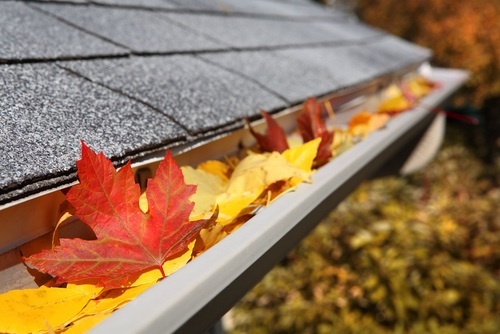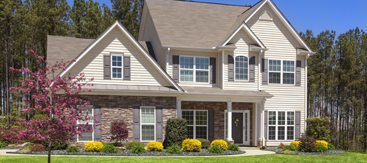
by Flagship Staff | Oct 2, 2015 | Blog

Gutters divert rain away from your home and are its first line of defense against water damage. However, as autumn progresses, leaves, twigs and other debris can clog your gutters and cause significant damage to your home.
When your gutters are obstructed, you may start to notice overflows and icicles. If you don’t quickly do something about these obstructions, water that can’t drain will eventually find the path of least resistance, which often leads into your home’s foundation or walls. This can cause major structural damage that often goes unnoticed until it’s too late. In areas that experience below-freezing temperatures, the water in your gutters, foundation and walls can freeze and expand, causing even greater damage.
The amount of foliage in your yard can impact how often you should clean your gutters, but, as a general rule of thumb, it should be done at least once a year and preferably both in the autumn and spring. You should never attempt to clean your gutters in slippery, windy or icy conditions.
Before you clean your gutters, make sure you have the right tools for the job, including a functional and safe ladder, garden trowel, dust mask, gloves and eye protection. Use the ladder to reach the gutters and dislodge any debris within arm’s reach; then, descend the ladder and move it in order to clean the next section. Don’t overreach or attempt to move the ladder while you are still on it. After you’ve removed all noticeable debris, use a garden hose to clear out the remaining dust and to test for any additional obstructions.
Since a ladder is needed to clean out debris, you may want to hire a roofing professional, who can also identify any leaks, damage or misalignment in your gutter system.
by Flagship Staff | Jun 30, 2015 | Blog
Outdoor tips to keep your family safe this summer
With July 4 upon us, many families have plans or are making plans for a weekend getaway or vacation. Whether you’re a veteran or a beginner, here are some safety tips for camping, boating, riding an ATV, or using fireworks.
Camping Safety Tips
1. Familiarize yourself with your campsite. Many times when we go camping, the car doors fly open and the kids are off as soon as we get to the campsite. While I know everybody is excited, it’s best to take a step back and look at the site first.
Some things to look for are:
Smoldering fires from the previous camper
Broken glass
Tree stumps
The slope of the site
Insects or poison ivy
Any leftover food that may attract animals.
2. Take plenty of water. Depending on where you’re camping, you may have access to streams or natural springs. While it may look clean to drink, it probably isn’t. If you’re really roughing it and the amount of water you can take is limited, iodine tablets can be used to purify water.
3. Pack antihistamines. For seasonal allergy sufferers, antihistamines are necessary. In addition, antihistamines are also very useful for those unexpected allergic reactions to bee stings, poison ivy, etc.
When I was growing up, my dad got stung by a bee and had a severe allergic reaction. It had never happened before so we had no idea he was allergic to them. In this instance, we had to call 911.
4. Notify family or friends. Before heading out on your camping adventure, tell family or friends where you’re going and when you expect to return.
Boating Safety Tips
1. Don’t drink and drive. This common-sense tip also applies to boating. According to the U.S. Coast Guard, alcohol was the leading cause of fatal boating accidents in 2013 where the primary cause was known. The effects of alcohol are amplified because of sun exposure, wind, and noise.
The boat traffic can be very heavy depending on the size of the lake. Staying alert is key to keeping your passengers, as well as other boaters and swimmers, safe.
2. Wear your lifejacket. Each person on board should have a U.S. Coast Guard-approved life jacket. If you decide you’re not going to wear it, make sure it’s easily accessible. You never know when a serious situation is going to arise.
3. Keep a watchful eye on the weather. Weather patterns can quickly change during hot summer months. Watch for changes in the wind direction and listen for thunder off in the distance. Take along a weather radio or SMART phone to help monitor the weather.
ATV Safety Tips
1. Take a rider safety course. If you’ve never ridden an ATV, and this is a new hobby, it’s wise to take a rider safety course. Many people jump on an ATV and away they go. So many unexpected things can happen, especially to an inexperienced rider. These vehicles are fast, and handling one in an emergency is much different than a car.
Always wear a helmet. An unexpected rut or bump can send you flying, maybe straight into a tree.
2. Wear appropriate clothing. Shorts and flip-flops are not appropriate clothing. When riding an ATV, you should wear:
Goggles
Long sleeve shirts
Pants
Gloves
3. Pick the right ATV. If you’re buying or renting an ATV, make sure it’s the right size. You should never ride or allow your child to ride an ATV that’s too big in size and horsepower. Again, they handle and react very differently from other modes of transportation.
Fireworks Safety Tips
1. Only competent adults should handle fireworks. If you’re nervous about using fireworks or you’ve had too much to drink, please leave them alone. Children should never be allowed to light them. Injuries often occur when the person handling the fireworks is inexperienced and/or judgment impaired. Most injuries are to hands and faces.
2. After fireworks burn out, toss them in a bucket of water or spray them with a hose. Pay special attention to sparklers. While they seem like one of the safest fireworks, they burn at a temperature close to 2,000 degrees. If your child drops a sparkler, tell him/her to leave it on the ground because it’s hard to tell which end is safe to pick up. Spray the sparkler immediately to put it out.
3. If you’re lighting fireworks that launch into the sky, plan for their landing in a safe area. Over the years, I’ve had the neighbor’s fireworks land on my roof, which I wasn’t very happy about. Please be mindful of the wind direction.

by Flagship Staff | Jun 22, 2015 | Blog
Many people use social media to keep in contact with friends and family, but burglars can use what you share online to know when your house isn’t occupied. Here are some tips to deter would-be thieves:
- Don’t share when you and your family will be out of the house for extended periods of time.
- Don’t use Facebook or other applications to check in with your physical location.
- Make sure that those traveling with you are not sharing your location without your permission.
- Wait until you are home to post photos from a vacation.
- Update social media sites to give the impression that you are home.
- Remember to check the privacy and location settings on your mobile phone and social media sites.
by Flagship Staff | Jun 15, 2015 | Blog
Your car’s tires are essential for safe and efficient driving. Normal wear and tear, along with the changing seasons, will decrease the effectiveness of your tires, leading to less traction and decreased braking ability. Use these tips to ensure that your tires are in good condition and that you are safe on the road.
- Inspect the tread wear bars on your tires, which appear as small bridges that form between treads. If you notice these bars are beginning to form between the treads or are running across the tires and become flush with the tires’ tread, your tires should be replaced.
- Take a standard penny and insert it into a tread, with the top of Lincoln’s head facing the center of the tire. If you can see the top of his head or the metal above it, your tires should be replaced as soon as possible. You should also consider replacing your tires if Lincoln’s hair is visible.
Tire maintenance is a key aspect to staying safe on the road. To learn more about your automobile insurance coverage, contact your Flagship Insurance Services, LLC today.
by Flagship Staff | Jun 8, 2015 | Blog
As the weather warms up, relaxing on an outdoor deck can be a great way to spend time with friends and family. However, the International Association of Certified Home Inspectors estimates that only 40 percent of the 45 million decks in North America are safe. Use these tips to inspect your deck and keep your friends and family safe.
- Inspections should begin at the bottom of your deck. If a deck seems unsafe or is sagging in any location, do not walk on the deck.
- Inspect the connection between your deck and the building to ensure that it is secure.
- Ensure that railings on the deck and stairways are properly supported and stable.
- Check for water sources near your deck that could contribute to accelerated wood decay. These can include the following:
- Lawn sprinklers that regularly come into contact with your deck.
- Indentations around your deck’s support beams where water may pool, especially in newly installed decks.
- Downspouts from gutter systems that exit near your deck.
- Narrow gaps in the deck’s floor boards that don’t allow water to pass through.
- Make sure that none of the deck’s wood has decayed. Keep in mind that layers of paint can hide decay.
- Visually inspect the beams below your deck for signs of sagging.
If you have any concerns about the safety of your deck, refrain from using it and contact a home inspector to perform a complete inspection. Using your deck should be a relaxing experience, and following these tips will help ensure that everyone using it will have a safe and enjoyable time.




